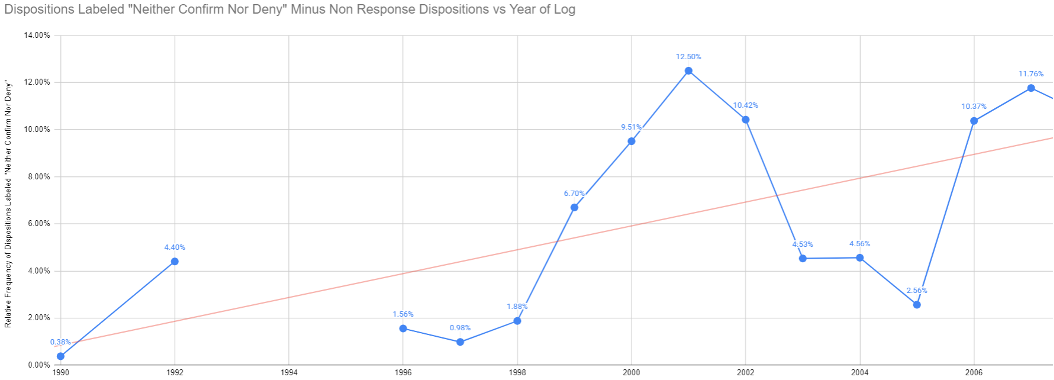|
The “Glomar response” is the government’s way of giving a non-answer reply to Freedom of Information Act (FOIA) requests. The template for this bureaucratic form of “no comment” derives from a mid-1970s case in which journalists sought information about the CIA’s secret project to use a salvage vessel, the Hughes Glomar Explorer, to bring a submerged Soviet submarine to the surface. The customary formulation, which The Project for Privacy and Surveillance Accountability has met with many times, is: “We can neither confirm nor deny that our agency has any records matching your request.” No one actually says, “This letter will erupt into flame in five seconds,” but it does have that flavor. PPSA has at least been able to pry information from the NSA to track the numbers and fluctuations in Glomar responses in recent years. The chart below does this, with a gap in the records from 1992 to 1996. (This chart excludes requests that failed to meet the technical criteria of the agencies and therefore required further follow up.) Starting in 1996, one can see a dramatic increase in the number of Glomar responses from 1.56 percent of FOIA filings in 1996 to almost 13 percent in 2001. The years of the George W. Bush presidency, interestingly, show a sharp decline in Glomar responses, even while the administration was executing aggressive surveillance programs in the aftermath of 2001, before rising again in 2006.
The takeaway here is that a remedy devised to defend classified projects vital to the national defense has become a routine way to knock aside legal inquiries authorized by law. PPSA has even received Glomar responses from the Director of National Intelligence to a FOIA request seeking information on the possible surveillance of Members of Congress serving on the two intelligence oversight committees in the House and Senate. Rest assured, PPSA will confirm – not deny – further data from future responses to our requests. Comments are closed.
|
Categories
All
|


 RSS Feed
RSS Feed